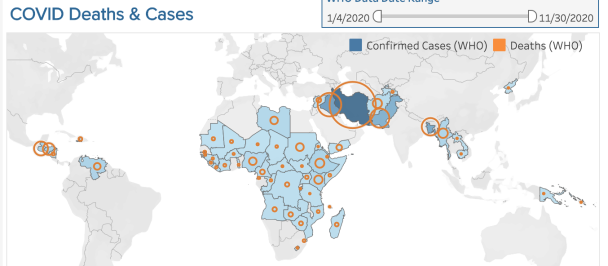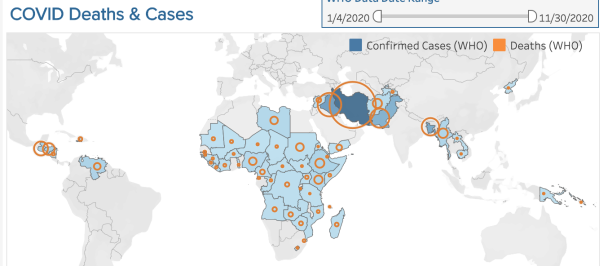It might almost come off as callous during these difficult times to speak of opportunities emerging from the coronavirus COVID-19. But when I survey the countries not on newspapers’ front pages, often fragile states emerging from war or on the brink of economic collapse, I see the possibility of what scholars call a “positive peace” following the pandemic.
To respond to the unimaginable conditions of this virus, the UN has launched the COVID-19 Global Humanitarian Response Plan (HRP), a coordinated effort between several agencies including UNDP, and led by the World Health Organization (WHO). The HRP will make its mark not only for the coronavirus but also, we expect, for future crises and disasters, whether natural or manmade, as it will synchronize our efforts, reduce response times, avoid duplication, and provide faster and more efficient relief to those hardest hit. That is critical to avoid a breakdown in peace processes, or to allow problems unmitigated to fester and spawn new crises.
The HRP will address other issues that hobble collective response efforts in the event of a global crisis. First, how will local responders cope if international organizations are confined or have no manoeuvre to work? How can organizations such as UNDP support them, while simultaneously guarding civil society? What if fragile contexts lose a broad cadre of trusted elderly leaders? What will this mean for social cohesion and political stability, especially if “fake news” continues to misinform?
Minimizing impact
When it comes to peace and security, what happens if peacekeepers are forced to stay confined to barracks? How can we minimize the impact of their reduced presence, whether when it comes to enforcing peace agreements, protecting civilians, or keeping economies afloat?
What impact will the pandemic have on the macroeconomic stability of fragile contexts, in areas already at risk of debt distress that may need to take on further debt to refinance broken health systems? If aid is diverted to deal with the immediate effects of COVID-19, what will this mean for progress towards the Sustainable Development Goals in fragile contexts, much less for peace and stability?
Finally, and perhaps on a more hopeful note, will this crisis create opportunities to end longstanding conflicts, not unlike how the 2004 tsunami helped pave the way for peace in Aceh, Indonesia?
As alluded to in a recent think piece from the International Crisis Group, there is emerging evidence of humanitarian gestures between rivals—the United Arab Emirates’ support to Iran, the United States’ to the Democratic People’s Republic of Korea and cross-border communication between Venezuela and Colombia.
Greater global solidarity
Yuval Noah Harari, author of the award-winning Sapiens, has also set out the case for greater global solidarity after the pandemic. He warns about some potentially sinister side effects, such as the deployment of widespread surveillance technology, the rise of authoritarianism, a breakdown of societal trust, and sets out interesting thoughts on the aptly-named “soap police”—those deputized to enforce people to wash their hands.
Harari calls for a global plan that includes countries sharing equipment and personnel, dealing with the economic fallout and not throwing up trade barriers, as well as sensible global travel guidance. If ever there was a wakeup call for greater global comradery and collective governance, this is it. Hard to believe only a few months back there was squabbling over the perceived bankruptcy and bottoming out of globalismas manifested by Brexit, the rise of populism, and the backlash against globalist efforts at Davos and elsewhere.
There is a thirst for solidarity not seen since the waning days of World War Two. Humanity requires a common voice and global leadership to defeat the coronavirus, to build resilience to reduce its secondary risks, and eventually to recover from the fallout. Our COVID-19 Integrated Response includes supporting the health response, the procurement and supply of essential health products such as x-ray machines, infrared thermometers, infusion pumps, protective suits, gloves and hand sanitizer, strengthening crisis management, and addressing critical social and economic impacts.
Expensive fallout
The Global Humanitarian Response Plan should hopefully raise the resources needed to alleviate the immediate human suffering caused by COVID-19. But that will not be enough to deal with the expensive fallout across the world’s most fragile states. Complementary funding will be needed. This can come through trusted development and peace partners such as UNDP, but regardless of its source, we must ensure this pandemic and its aftermath is managed in a systemic way. In a best-case scenario, this funding could be on a “no regrets” basis; even if the COVID-19 risks do not manifest themselves, the related programming will still provide positive benefits for the world’s most vulnerable societies. This funding could also help seize what might be once-in-a-lifetime opportunity for peace. In the worst-case scenario—that is, if COVID-19 does lead to a significant increase in conflict—this funding will help support critical prevention measures, saving lives, and saving money.
Everyone must play a role
To talk of opportunities is not to downplay the magnitude of this crisis, nor is it to ignore those suffering. It is seeking out a silver lining that can both prevent future tragedies while putting in place a more robust and synchronous architecture to ensure a faster response were another coronavirus-like crisis to erupt.
COVID-19 is not just a humanitarian or public health crisis. Everyone must play a role. This includes diplomats as well as development workers. Although this is only my first month at UNDP, I can say that I am amazed by UNDP’s ability to leverage its uniquely massive global footprint—it is to respond both robustly yet also rapidly.
It is often said UN agencies are at their best during a time of crisis. And tragedies are often the wellspring of opportunities and innovation. The HRP will hopefully be one legacy of the current crisis that makes for a more effective response to future emergencies. For that we can be grateful and, dare I say, optimistic.

 Locations
Locations

